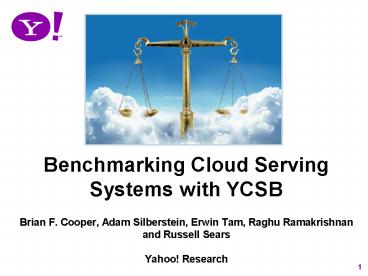Benchmarking Cloud Serving Systems with YCSB Brian F. Cooper, Adam Silberstein, Erwin Tam, Raghu Ramakrishnan and Russell Sears Yahoo! Research - PowerPoint PPT Presentation
1 / 16
Title:
Benchmarking Cloud Serving Systems with YCSB Brian F. Cooper, Adam Silberstein, Erwin Tam, Raghu Ramakrishnan and Russell Sears Yahoo! Research
Description:
Benchmarking Cloud Serving Systems with YCSB Brian F. Cooper, Adam Silberstein, Erwin Tam, Raghu Ramakrishnan and Russell Sears Yahoo! Research – PowerPoint PPT presentation
Number of Views:677
Avg rating:3.0/5.0
Title: Benchmarking Cloud Serving Systems with YCSB Brian F. Cooper, Adam Silberstein, Erwin Tam, Raghu Ramakrishnan and Russell Sears Yahoo! Research
1
Benchmarking Cloud Serving Systems with
YCSBBrian F. Cooper, Adam Silberstein, Erwin
Tam, Raghu Ramakrishnan and Russell SearsYahoo!
Research
2
Motivation
- There are many cloud DB and nosql systems out
there - PNUTS
- BigTable
- HBase, Hypertable, HTable
- Megastore
- Azure
- Cassandra
- Amazon Web Services
- S3, SimpleDB, EBS
- CouchDB
- Voldemort
- Riak
- Etc Tokyo, Redis, MongoDB,
- Dynomite
- How do they compare?
- Feature tradeoffs
- Performance tradeoffs
- Not clear!
3
Goal
- Implement a standard benchmark
- Evaluate different systems on common workloads
- Focus on performance and scale out
- Future additions availability, replication
- Artifacts
- Open source workload generator
- Experimental study comparing several systems
4
Benchmark tool
- Java application
- Many systems have Java APIs
- Other systems via HTTP/REST, JNI or some other
solution
- Command-line parameters
- DB to use
- Target throughput
- Number of threads
- Workload
- parameter file
- R/W mix
- Record size
- Data set
YCSB client
Cloud DB
Client threads
DB client
Workload executor
Stats
Extensible define new workloads
Extensible plug in new clients
5
Benchmark tiers
- Tier 1 Performance
- Latency versus throughput as throughput increases
- Sizeup
- Tier 2 Scalability
- Latency as database, system size increases
- Scaleup
- Latency as we elastically add servers
- Elastic speedup
6
Test setup
- Setup
- Six server-class machines
- 8 cores (2 x quadcore) 2.5 GHz CPUs, 8 GB RAM, 6
x 146GB 15K RPM SAS drives in RAID 10, Gigabit
ethernet, RHEL 4 - Plus extra machines for clients, routers,
controllers, etc. - Cassandra 0.5.0 (0.6.0-beta2 for range queries)
- HBase 0.20.3
- MySQL 5.1.32 organized into a sharded
configuration - PNUTS/Sherpa 1.8 with MySQL 5.1.24
- No replication force updates to disk (except
HBase, which primarily commits to memory) - Workloads
- 120 million 1 KB records 20 GB per server
- Caveat
- We tuned each system as well as we knew how, with
assistance from the teams of developers
7
Workload A Update heavy
- 50/50 Read/update
8
Workload B Read heavy
- 95/5 Read/update
9
Workload E short scans
- Scans of 1-100 records of size 1KB
10
Elasticity
- Run a read-heavy workload on 2 servers add a
3rd, then 4th, then 5th, then 6th server.
11
Elasticity
- Run a read-heavy workload on 2 servers add a
3rd, then 4th, then 5th, then 6th server.
12
Experiences
- The benefits of an open-source toolkit
13
Experiences
- The rapid evolution of cloud systems
14
Future work
- Tiers for replication, fault tolerance
- More database bindings
- More scenarios
- More expressive experimental setups
15
Conclusions
- YCSB is an open benchmark for cloud serving
systems - Experimental results show tradeoffs between
systems - The benchmark (and the systems themselves) are
evolving
16
For more info and code
- http//wiki.github.com/brianfrankcooper/YCSB/































